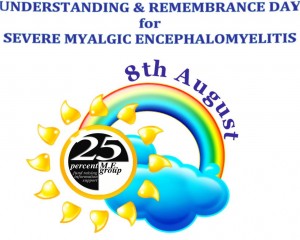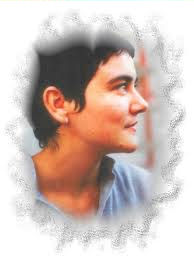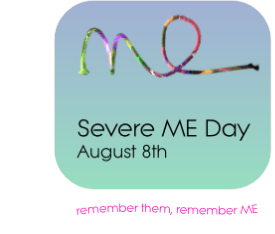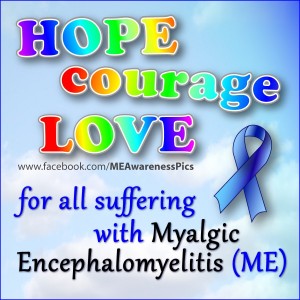View the Post on the Blog
View the Post on the Blog
Gabby (Nielk) reports on the launch by The 25% Group of this special day of understanding and remembrance for those severely affected by ME

I wrote the poem below about two years ago, in the midst of one of my harshest crashes. I was bedridden for many months. I was in pain most of the time and totally helpless and reliant on others. It was the darkest time of my life...
However, I consider myself one of the lucky ones, in that I eventually recovered to the point where today I am able to somewhat function: mostly within the confines of my house.
I Just Don't Belong
Sometimes you get the short end of the stick
You think, how can it be? It must be a trick.
Is this a law of nature that things stay perpetually down?
Is it okay that every day in your life is cause for a frown?
Unrelenting pain - you can't satisfactorily explain it.
It's a feeling that keeps you in the darkest, deepest pit.
I wish I knew a way out, for a temporary respite,
Where things are nice, light, fluffy and always white.
I have forgotten how to be healthy and strong
To be among functional humans - I just don't belong...
Nielk (2011)
It is estimated that 25% of Myalgic Encephalomyelitis (ME) patients are severely affected - often housebound and/or bedridden and for many years. They have been largely invisible, greatly misunderstood and mostly ignored.
It is a heavy burden to bear. When I heard mention of a special day for understanding and remembrance for severe ME patients, I filled with a desire to do something that might help.
I wanted to learn more about it and found out that the idea was conceived by Diane, the mother of a severely affected ME patient, and was subsequently taken on by The 25% M.E Group.
I asked Diane to explain why she thought this special day was important and to describe what it is like being the carer of a severely affected daughter. Carers are truly the unsung heroes of this tragedy.
Severe M.E. through a carer's eyes: Diane's story...
"The question that's been dancing in my mind for a long time is, how can the general public be made aware of the seriousness of Myalgic Encephalomyelitis? How can their minds be re-programmed to the truth because up until now Myalgic Encephalomyelitis has been globally misunderstood and gravely trivialized.
Myalgic Encephalomyelitis is not a new disease, yet if you were to type 'M.E. symptoms' into a search engine, the chances are words like fatigue, malaise, brainfog, sore throat, insomnia, and depression would jump off the page.
But where are the words that truly describe severe Myalgic Encephalomyelitis – the seizures, paralysis, intractable pain, blackouts, coma-like experiences, incontinence, tremors, cardiac dysfunction, dyscalculia, dysphasia? A hundred symptoms could be listed here with not one mention of fatigue or any of its common misconceptions.
And where are the explanations that a group of seriously ill adults and children, are so severely ill that everyday activities and sensory stimuli, like being washed or the noise of a passing airplane, can be life-threatening?
My daughter has very severe Myalgic Encephalomyelitis and she is the reason why 8th August Severe Myalgic Encephalomyelitis Understanding & Remembrance Day has come into being. Well, her and over 25% of the M.E. population. When you take that percentage into consideration, it means there's hundreds of thousands of people around the world with severe/very severe Myalgic Encephalomyelitis. We're not talking about a rare disease here, so why is M.E. cloaked in so much ignorance?
As a carer mum, I witnessed M.E. come crashing into my daughter's life, quickly ravaging her health at vampirish speed. I was forced to watch my once healthy and active daughter shrivel into a tiny paralytic rag-doll body with a dysfunctional 'mashed potato' brain. Myalgic Encephalomyelitis literally sucked her health right out and replaced it with a multitude of symptoms and unending pain. That's another thing I have to witness – my daughter in agonizing pain, every day.
The carer of an M.E. loved one is constantly being thrown into battle. Ignorance is always the enemy. Carers are so weary from their battle scars and desperately want doctors, friends, family, authorities, the media, comedians, and the whole world to finally understand that Myalgic Encephalomyelitis is a serious, life-threatening disease. They want an end to the 'it's just M.E' mentality. They want people to stop pointing judgmental fingers at their loved ones' suffering.
If you look through a carer's eyes, you will see sights that shouldn't be seen. You will see the truth of severe/very severe M.E.
My daughter is totally bed-bound. Her days are spent in a darkened room and in as much silence as the outside environment will allow. Any form of exertion (including talking or sensory stimuli) can cause seizures, blackouts, paralysis, increased pain and much more. Her recovery time is usually slow. Sometimes recovery never happens and disease progression results. Fatality is an everyday risk.
Her world is one of complete isolation. But this is also the world of thousands of adults and children with severe/very severe Myalgic Encephalomyelitis. This is their reality. Yet the truth of what is happening to them, the truth of their disease, doesn't seem to be penetrating the 'it's just M.E.' mindset. The truth is seeping out but it's not being absorbed. Not even by the medical profession."
Remembering Sophia and others...

Sophia Mirza
The 8th August is Sophia Mirza's birth date. This year would have been Sophia's 40th birthday. Sophia died from severe Myalgic Encephalomyelitis at the age of 32 as a result of medical abuse and ignorance. Sadly no lessons have been learned since her tragic death. Would it shock you to know that children and adults around the world are still forcibly taken from their homes and put into psychiatric facilities because they have a physical, neurological disease?
Our world is now faced with a situation of urgency. Adults and children are suffering from a severely disabling and life-threatening disease, yet there are not enough doctors to treat them because they lack appropriate medical training and knowledge. Governments around the world are not funding scientific medical research with enough urgency and there is a gross lack of specialist medical centres and clinics to offer expert advice, treatment and support. The urgent need to move away from the universal ignorance that surrounds Myalgic Encephalomyelitis cannot be stressed enough.
Therefore, every 8th August, please remember that there is a significant group of seriously ill children and adults that need your help. Their quality of life is so heartbreakingly poor. They need your understanding. They need to be acknowledged and remembered. And you need to know the true facts of this disease because M.E. isn't fussy who it attacks next.
The 25% Group

The 25% Group from the UK has been formed to act for severely ill patients. They have taken on the representation, support and awareness raising for those who suffer from severe ME. They have launched and announced 'August 8th - Understanding and Remembrance Day for Severe Myalgic Encephalomyelitis' . In their informative leaflet regarding this event, they state: "Myalgic Encephalomyelitis is one of the most disabling diseases there is. The level of disability can exceed that in Polio, MS, advanced HIV, and other serious illnesses, including the effects of chemotherapy."
I asked the 25% Group to answer a few questions explaining the importance of and the reason why they have taken on this project...
What is the importance of creating a special Understanding and Remembrance Day for severely ill ME patients?
The 25% ME Group completely agree with Diane about the need to highlight the seriousness of severe M.E. – to the media, to the general public, and to professionals. We are very pleased to support and host this initiative.
Understanding is absolutely necessary. Without understanding, there can be no care. I often think that what is generally considered as severe M.E. is actually fairly typical for an M.E. patient. After all, this is a devastating illness. Not a minor ailment. The most severe cases, on the other hand, are off the general radar altogether and their symptom severity is off the scale.
Remembrance means honoring the memory of those who are no longer with us. Too many have died from complications of this illness; others have come to feel that living with the burden of pain and debility, day in and day out, is just too much and have given up the fight. Others may have lived on to old age and lost their lives through other causes, without ever getting relief from their long term M.E.
Sadly, the case histories of those who are no longer with us are far too often marred by encounters with lack of understanding.
Remembrance highlights the need for improved Understanding – they go very much hand in hand.
What can clinicians and researchers specializing in ME do to care and incorporate the severely ill?
Well, there are very few clinicians and researchers who do actually specialize in M.E. At the same time there is an associated problem – and a major one at that – in that clinical and research work on chronic fatigue is being misapplied to this patient group, to the detriment of people with M.E.
To repeat - without understanding, there can be no care.
So the first step is for clinicians to gain an understanding of the distinctive clinical profile that is M.E. - and stop confusing it with chronic fatigue. Understanding why patients present as they do is also important. Many pointers have emerged regarding the biomedical basis of this illness. Given the range, nature, and extent of pathogenesis that has been demonstrated, it is astonishing that the view that a secondary process in the form of physiological de-conditioning consequent on inactivity provides an ‘explanation’ has been permitted to flourish.
In terms of clinical care I’d like to refer to the views of our medical adviser, Dr Nigel Speight:

“M.E. sufferers deserve a medically led service, with the authority to make a definitive diagnosis of ME. The service should be staffed by doctors who can tolerate the severity of some cases and their own feelings of impotence when confronted with them, and not feel duty bound to ‘cure’ their patients somehow. Currently there is no curative treatment available. Patients quite accept this and it is often the doctors who find it difficult, and thereby fall into the trap of the ‘Therapeutic Fallacy’ whereby they can’t accept the failure of their treatment regimes. This can lead to them rejecting their patients - or even worse, blaming the patient or their family for the failure of their treatment.”
Those who are most severely ill stand to benefit greatly from improved understanding of M.E. Sadly, the blaming of M.E. patients for their condition is endemic and it would seem that the more sick and debilitated a person is, the more they are held to be responsible.
Once we have understanding, an obvious practice for inclusion would be provision of home visits for medical services – including specialist consultations that would normally happen only at hospitals.
Regarding research, there is no doubt that the very extreme nature of severe M.E. and the hypersensitivity to stimuli in all shapes and forms creates a very real barrier to the inclusion of severe sufferers in research studies.
I believe that this has been an issue in conducting the B-cell depletion therapy research in Norway. But look at the findings when the research is done! Clear pointers towards the existence of an underlying immunological dysfunction. And very substantial improvement in responders – without the gradual build up of activity so beloved of the current orthodoxy. There is hope for the future here.
How can we best support and care for the severe ME patients?
I’ll hand you over to carer Greg Crowhurst [Stonebird] and his severely affected wife Linda as the voices of experience on this question. Here is what Greg and Linda say...
Understanding the physical reality of the person is the best way to support and care for someone with Severe ME.
Your approach and understanding can make such a difference. You can be a lifeline, a true support, an advocate, a help. Or you can just be another part of a tormenting hostile environment, alienating the person still further, inadvertently adding to their discomfort and neglect.

The experience of the world in which the person with Severe ME lives is not the same as your own; it takes time, effort and great compassion to enter into a genuine supportive and caring relationship. The person's experience is altered fundamentally by the degree of environmental hypersensitivity and physical dysfunction that they have. This is expressed in different ways for different people.
You need to understand how very seriously ill the person is. It is important to learn how and when to approach someone with Severe ME. Because to not do so can - and most likely will - lead to deterioration, exacerbation of symptoms and actual harm to the person.
You just have to try and comprehend the person with Severe ME's experience, to sensitively engage in safe ways, in order to bring connection and support to the person.
You need to consider what triggers or worsens their symptoms. You need to know what not to do in their presence.You need to knowhow to speak - slower, quieter, without questions, only for a couple of words, or not at all. You need to be flexible. You need to be willing to try again.
You must see the person as an equal, not victimise or patronise them or ignore what they tell you. Listening, caring, responding appropriately with understanding, reflecting, being creative and imagining their life: these are all things that will help the person have a better quality of life.
It will not make them well. They will continue to be severely disabled and ill, but you will have made a difference.
As highlighted in my Nursing Standard article Supporting people with severe myalgic encephalomyelitis*, interaction is key to caring and supporting people with Severe ME. Using the ‘Moment’ approach can help your understanding. There may be moments when things are easier to cope with or bear. Or there may be moments when something is more possible to try, attempt or bear, than in other moments.
The person will know when they can manage something, when they might try to do something and when they definitely cannot bear any contact or stimulation. You can never be a better judge of this than the person. Respecting this simple principle is a step in the right direction.
Finally, understanding the political and medical context within which the person with Severe ME tries to cope with their severe illness is also relevant. However that would be the topic for an article in itself.
*Supporting people with severe myalgic encephalomyelitis. Crowhurst G. Nursing Standard 2005; 119(21): 38–43.
Links and Resources...
A range of items to help promote Severe ME Understanding & Remembrance are available at the 25% ME Group’s website: just follow the link from the Home page.
Severe ME Understanding and Remembrance Day - Facebook page
Severe ME Day - Video
Greg and Linda Crowhurst have more guidance on how to care for someone with Severe ME at their ‘Stonebird’ website.

Other severe ME links...
Karina Henson - Danish ME patient held in hospital against her will. Petition for Karina
In Memoriam - The National CFIDS Foundation compiled this list to make people aware of the seriousness of CFIDS/ME
Voices from the Shadows - One hour documentary bringing witness to the plight of the severely ill ME patients in the U.K.
Diane's story: - The carer of her daughter; severely ME patient Lily
Don't let ME Die in Vain - Facebook page dedicated to take active steps and support for the 25% of severely affected
Emily Collingridge - 1981-2012
Lynn Gilderdale - Diary
JK Rowbory - Severe ME site
The World of One Room - Severe ME awareness video
Seven Years in the Making - Severe ME awareness video
Laurel's October 2009 CFSAC testimony - Severe ME awareness video
Sarah - Severe ME awareness video
Alice - Severe ME awareness video
Gabby is a patient with ME/CFS – disabled since 2003 – and is passionate about raising awareness of the plight of severe sufferers of this disease.
Phoenix Rising is a registered 501 c.(3) non profit. We support ME/CFS and NEID patients through rigorous reporting, reliable information, effective advocacy and the provision of online services which empower patients and help them to cope with their isolation.
There are many ways you can help Phoenix Rising to continue its work. If you feel able to offer your time and talent, we could really use some more authors, proof-readers, fundraisers, technicians etc. and we'd love to expand our Board of Directors. So, if you think you can help then please contact Mark through the Forum.
And don't forget: you can always support our efforts at no cost to yourself as you shop online! To find out more, visit Phoenix Rising’s Donate page by clicking the button below.
View the Post on the Blog

